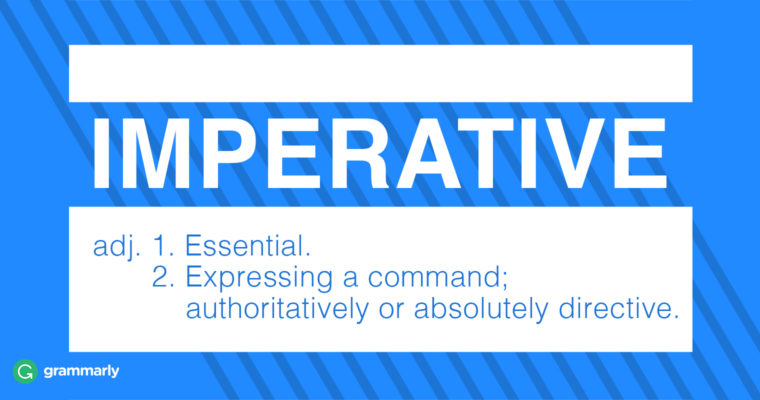
Imperative can be one of the following:
- An adjective meaning “completely necessary” or “very important,” but also “commanding.”
- A noun meaning “a necessity” or “something that is not avoidable,” but also “a command.”
- In grammar, imperative is also one of the four main verb moods.
Imperative is one of those words that shouldn’t be thrown around unless there’s a very good reason for it. Not everything in the word is imperative, or an imperative. But if you’re not sure what the definition of imperative is and what it has to do with imperative sentences, you’re in the right place. We’ll explain what imperative means, how to use it in a sentence, and how imperative sentences are different from indicative sentences.
Imperative definition
When you define the word imperative, you should note that it can be an adjective and a noun. In both cases, imperative has two distinct meanings: one of urgency, necessity, and importance and another of trying to influence other people’s actions.
The adjective imperative means that something is of the utmost importance or necessity. It can also mean that something is commanding. Similarly, the noun imperative means “something of the utmost importance or necessity”—something imperative. It also means “a command.”
What is an imperative sentence?
Imperative can be traced all the way back to the Latin word imperare, which means “to command.” This is the sense in which the word is used today in grammar, and you might have seen it going together with the words mood and sentence.
The imperative mood is one of the four main verb moods in the English language. As opposed to verb tenses, which indicate time, moods indicate states. The imperative mood indicates the state of commanding. Here’s an example of an imperative sentence:
In this sentence, someone is giving a command. It can be easily distinguished from indicative sentences, which simply state that something has happened:
He sat down and ate his lunch.
In case you’ve noticed that imperative sentences sometimes don’t have a subject, you should know that they do, even if it’s not actually written in the sentence. You is the subject in this case, but since it’s not written, it’s called you understood, and it’s written as (you).
Imperative—how to use it
If you’re wondering how to use the word imperative in a sentence—simply put it there when you want to describe something as very important. The place of imperative on the scale of adjectives that imply importance is debatable, but it is certain that something that is imperative is more important than something that is nonessential, trivial, unimportant, or optional. These words are the antonyms of imperative. Its synonyms include the words crucial, vital, critical, and pressing.
On the other hand, imperative can also be used to say that something is commanding. So a person who speaks with an imperative tone of voice is probably a person who is used to issuing commands.
As for the imperative mood, you make it by taking the infinitive of a verb and removing to. Use it when you want to issue commands and orders, but also when you want to make requests—just remember to add please to the sentence.
Imperative examples
In my view, mediamacro and its focus on the deficit played an important role in winning the Conservatives the 2015 general election.
—New Statesman
It was “imperative” that the rules ensured bosses could not avoid their responsibilities to pay pensions, they added.
—BBC
“Acting East” is no longer just an option but an imperative for Indian foreign policy.
—The Japan Times
The need for an honest evaluation of the military’s flaws and failures becomes an imperative for those with a sincere and substantive desire to “support the troops.”
—Salon






